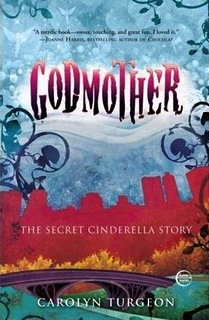Godmother: The Secret Cinderella Story
by Carolyn Turgeon, 2009
Reviewed by Erzebet YellowBoy
 It was a beautiful, lazy afternoon. The sun was shining, the bees were zipping from flower to flower and I was preparing to lie back on a lounge chair with Godmother: The Secret Cinderella Story by Carolyn Turgeon. It was one of those days that couldn’t possibly get any better and then, as I opened the book, into my lap fell two glass slippers as though my fairy godmother had appeared. Okay, I’ll admit they were actually temporary tattoos that had been tucked into the front cover by a mischievous author, but at that moment, a spell was cast.
It was a beautiful, lazy afternoon. The sun was shining, the bees were zipping from flower to flower and I was preparing to lie back on a lounge chair with Godmother: The Secret Cinderella Story by Carolyn Turgeon. It was one of those days that couldn’t possibly get any better and then, as I opened the book, into my lap fell two glass slippers as though my fairy godmother had appeared. Okay, I’ll admit they were actually temporary tattoos that had been tucked into the front cover by a mischievous author, but at that moment, a spell was cast.
I will also admit that I started reading with trepidation. The story of Cinderella has been told and retold so many times that one must wonder if anything new can come of it. On the surface, it might appear that Godmother is a lighthearted story. The bright cover cheerfully captures the author’s magical New York City in which the story (mostly) takes place, while the fonts used in the first few pages add a sense of whimsy to the mix. As we begin to read the book, however, it quickly becomes clear that something went terribly wrong with someone’s happy-ever-after.
Godmother is told from the point of view of Lil, an old woman who works in a bookshop. I connected with Lil immediately; we share a love of books and of morning rituals. But Lil is one of those unassuming characters who takes us unawares—at first glance, she is a little old lady with all of an old lady’s woes. Her morning rite involves a careful re-reading of a book left untitled by Turgeon, but her description of the illustrations inside tell us that it is an old copy of Cinderella. This is our first clue that Lil isn’t all that she seems.
Lil is, of course, that fairy godmother of legend, the one who was responsible for getting Cinderella to the ball. It is Lil’s story that Turgeon is telling, and it is not the story readers might expect. What we have here is a fresh look at the motives behind the fairy godmother’s actions. It is in many senses a cautionary tale: Lil follows her heart and the consequences are immense. But despite this, Lil can be nothing other than what she is—a fairy godmother—and when she gets it right we can’t help but cheer her on.
Turgeon’s fluid prose should not fool readers into thinking that this is an easy story to digest. All of the characters that populate Lil’s world are as well-wrought as Lil herself, but it is the tale in which they take part that carries us through. And who is to say that the resolution Lil gets is not the one she needs? I am happy to report that the spell that was cast when two glass slippers fell into my lap didn’t end when the final page turned. Godmother is a tale of love, regret and redemption that left me in tears and kept me pondering the human condition long after the clock struck midnight.

